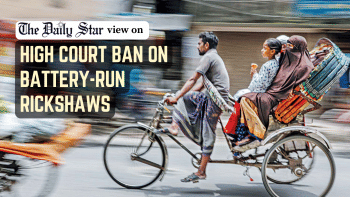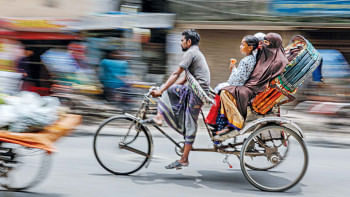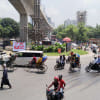A roadmap for rickshaw management is essential

The unplanned growth of our cities has exacerbated the management crisis surrounding rickshaws, adding to the woes of an already chaotic transport sector. Battery-powered rickshaws, in particular, have gained popularity nationwide as a more convenient alternative to pedal rickshaws. However, since these vehicles are unsafe by design and poorly regulated, accidents occur frequently, which shows the urgency of formulating a comprehensive policy to manage their operation effectively.
Over the years, the authorities have made various attempts to control the spread of battery-powered rickshaws. In Dhaka and Chattogram, battery-run rickshaws were banned by the High Court in 2014, with a subsequent directive in December 2021 prohibiting their import. In August 2015, the government banned three-wheeled, non-motorised vehicles on 22 roadways across the country. The Road Transport Act of 2018 further restricted battery-powered rickshaws, along with vans and other three-wheelers, and in 2023, the government unveiled the "Registration and Movement of Electric Vehicles Policy." However, this policy neglected to address battery-operated rickshaws specifically, leaving a regulatory gap.
From pedal rickshaws to battery-run rickshaws
The history of the origin of rickshaws in Dhaka goes back to 1938 when six rickshaws were brought into the city by a zamindar from Sutrapur and a Marwari trader from Wari. This significant moment, documented in a 1986 BIDS publication, marked the beginning of Dhaka's rickshaw industry. By 1944, according to Robert Gallagher's 1992 research book "The Rickshaws of Bangladesh", Dhaka licensed its first 100 rickshaws. By 1948, it was 575, and by 1972, the number increased to 23,000. However, there were more pullers than there were rickshaws, as many drivers shared the same vehicle. The Dhaka City Corporation (DCC)—the sole licensing authority until 1986—issued 79,554 rickshaw licenses, yet since its bifurcation, the city's North and South corporations have conspicuously lacked data on the number of rickshaws in operation. This added complexity to managing the industry.
The transition to battery-powered rickshaws began between 2007 and 2009 when local workshops outfitted the vehicles. Auto-rickshaws and easybikes are the two primary varieties of battery-powered rickshaws. An electric motor and lead-acid batteries were added to the rickshaw frame, allowing it to operate at high speeds. However, these rickshaws or easybikes, often built with low-quality parts and batteries, lack essential safety features, making them dangerous for drivers, passengers, and pedestrians alike.
Rickshaw-related research findings
Research on rickshaws and their pullers/drivers can help policymakers understand the industry's scale and impact. According to a 2019 study by the Bangladesh Institute of Labour Studies (BILS), Dhaka alone has around 1.5 million rickshaw operators, with five million nationally relying on the vehicles for their livelihood, contributing around Tk 30,000 crore to the rural economy each year. Therefore, regulation and registration, especially zone-based management, are essential to address the issues posed by unregulated battery-powered rickshaws.
A May 2024 study by CLEAN found that 1.4 million easybikes collectively use approximately 659 MW of electricity daily, serving about 25 million people for short-distance transport. The easybike system contributes approximately Tk 97,625 crore to the national economy, according to the study, with major contributions from manufacturing, battery, and services related to charging, servicing, and commuting. The study suggests that proper regulation of easybikes could add Tk 8,000 crore to the national exchequer if they were legalised, licensed, and subjected to regular renewals. To promote sustainable use, the study also recommended shifting to lithium-ion batteries, offering driving courses and licenses, setting up solar-powered charging stations, etc.
From October 2021 to September 2023, the Bangladesh Energy and Power Research Council (BEPRC) carried out a project titled "Development of a Design Standard for Easy Bike in Bangladesh." Conducted by BUET's mechanical and electrical engineering departments, the project focused on creating a standard for easybike manufacturing, assembly, and importation. The project findings suggested that safety could be enhanced by improving the braking system, adding doors, and altering seating capacity. Replacing lead-acid batteries with lithium-ion batteries would reduce pollution and extend battery life. However, large-scale adoption of these changes could be hindered by the significant amount of illicit money involved in the unregulated sale of battery rickshaw number plates and inferior batteries.
Guidelines for sustainable rickshaw management
Immediate action is needed to establish and enforce operating guidelines for both pedal and battery-powered rickshaws. But first, public walkways should be cleared for pedestrian use, and a rental bicycle system could encourage more people to cycle. Improved public transportation could also gradually reduce the dependency on rickshaws. Temporarily halting the production and sale of all rickshaw models and banning battery rickshaw imports are further steps to curb proliferation. That said, we should ensure that all these vehicles are properly registered and standardised. Community-based rickshaw systems, similar to those in DOHS and Bashundhara, could be expanded, while a QR code-based registration for rickshaws could facilitate regulation. Finally, decentralising Dhaka's concentrated economic and social opportunities is essential for alleviating transportation crises and reducing traffic congestion.
The rickshaw industry, both pedal and battery-powered, is deeply intertwined with the socioeconomic fabric of Bangladesh. By establishing and enforcing a structured rickshaw management system, including regulated standards, safer designs, and environmental measures, the government can transform rickshaw dependency into a safer, more efficient, and economically beneficial system for all.
Hossien Muhammed Zaki is a researcher pursuing MPA at Bangladesh Institute of Governance and Management (BIGM).
Views expressed in this article are the author's own.
Follow The Daily Star Opinion on Facebook for the latest opinions, commentaries and analyses by experts and professionals. To contribute your article or letter to The Daily Star Opinion, see our guidelines for submission.

 For all latest news, follow The Daily Star's Google News channel.
For all latest news, follow The Daily Star's Google News channel. 











Comments